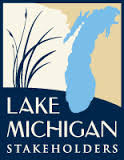2017 Lake Michigan Champions of Conservation
Left to right: Vicky Harris and Jon Kukuk (Wisconsin Marine Association and Clean Marina Program), Cathy Pabich, Steve and Andrea DeBaker (Trout Springs Winery), Wendy Lutzke
Individual Award, Water Resources Protection:
This year, we awarded two individual winners, Wendy Lutzke and Cathy Pabich. Wendy, a professional educator in elementary classrooms and at the Wisconsin Maritime Museum in Manitowoc, spread awareness of the Great Lakes to thousands of students through the Watershed Ambassadors Summer Camp and many other initiatives.With co-leader Kim Kettner, she formed the Friends of the Manitowoc River Watershed in 2012, which has launched annual river and bi-annual beach cleanups, adopted Lower Schuette Park, offered educational seminars and river paddling experiences, and supported City beach improvement projects ever since.
Business Award, Water Resources Protection:
This year’s business champion is Trout Springs Winery. Located near Wayside, TSW is owned by Steve and Andrea DeBaker and is a division of Branch River Farms, Wisconsin’s only licensed private fish hatchery, plant nursery and winery under one roof. From 1995 to 2005, Steve -- full time electrician and self-educated entrepreneur -- transformed their five-acre horse pasture into a vineyard, and has continued to expand and refine their operations ever since. They’ve installed many energy-saving and energy-producing systems to meet their energy needs and reduced their carbon emissions by 68%. In 2016, TSW was granted Green Masters Program Certification from the Wisconsin Sustainable Business Council. Steve spearheaded the effort to establish the Wisconsin Ledge AVA (American Viticultural Area) in 2012, with help from Eric Fowle of the East Central Wisconsin Regional Planning Commission. This AVA covers 3800 square miles in northeast and east central Wisconsin along the Niagara Escarpment.
Community Organization Award, Water Resources Protection:
The Wisconsin Clean Marina Program, the 2017 organization champion, is part of the Wisconsin Marine Association. The program provides guidance, training and education to 21 marinas and 14 others pledged to ‘keep Wisconsin’s waterways free of harmful chemicals, excess nutrients and debris…,’ all working toward best management practices.
They recognize how minimizing pollution helps protect resources essential to their livelihoods – clean water, air, and healthy fish and wildlife communities. They represent a wide array of Lake Michigan and Lake Superior coastal communities.
General Manager Michelle Strider of Washburn serves as the organization’s chair. Jon Kukuk of Marinette, owner and operator of Nestegg Marine, is the program’s vice chair.
Policy Maker, Land Use Protection and Habitat Restoration:
Senator Baldwin
Our honorary policy maker award goes to US Senator Tammy Baldwin for her extensive efforts to protect the Great Lakes and many other public policies and funding vital to the environmental needs of the Great Lakes region. She has consistently joined with colleagues on the US Senate Great Lakes Task Force to support full funding of the Great Lakes Restoration Initiative, and, as a member of the Senate Appropriations Committee, has been instrumental in advocating for GLRI funding. In 2016, Senator Baldwin joined by bipartisan Great Lakes Senators, introducing the Great Lakes Ecological and Economic Protection Act (GLEEPA) that included authorization the GLRI at $475 million annually as well as authorization and funding for other key Great Lakes programs. Despite not passing, near the end of the last Congress, the GLRI was reauthorized in a provision included in the bipartisan Water Resources Development Act (WRDA), with Senator Baldwin helping to lead the fight to make sure the GLRI was strengthened in this legislation.
Additionally, Senator Baldwin has championed innovative solutions to challenges in the Great Lakes region, including introducing the bipartisan Digital Coastal Act and authoring the Waterfront Community Revitalization and Resiliency Act. The Digital Coastal Act legislation will help shoreline communities along the Great Lakes better prepare for storms, cope with varying water levels and strengthen economic development planning efforts. The Waterfront Community Revitalization and Resiliency Act will support community efforts to make the most of water resources by attracting water-dependent industries and investments that leverage water sustainably, revitalizing neighborhoods, and enhancing recreation and tourism.


